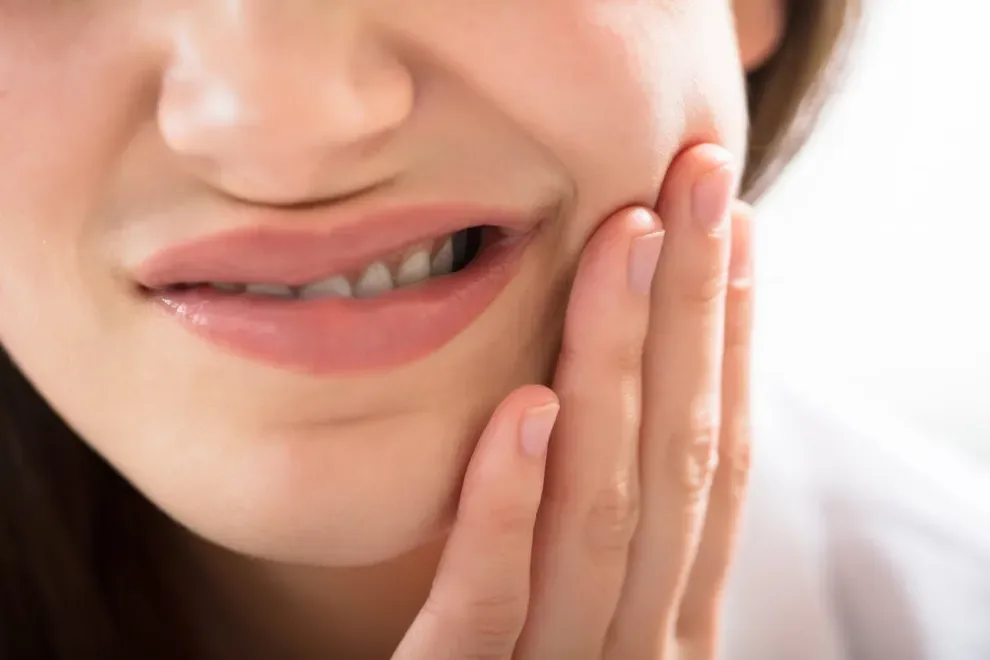Blister on Gums & Gum Boils: Causes & Treatment

Table of Contents
- Common Causes
- Caring for Gum Blisters
- Less Common Causes
- What are Gum Boils?
- Gum Boil Causes
- Gum Boil Risks
- Gum Boil Treatment
- Gum Blister or Boil Popping
- References
Feeling a blister or boil on your gums can be alarming, especially when you look and see a bump that wasn’t there before. You may be wondering what’s caused it and what you can do to get rid of it.
Before you panic or try to pop the blister on your own, it’s important to understand that there are many causes of gum blisters and boils. Different types of blisters will require different types of care.
Gum blisters are small lesions that appear in the soft tissue in the mouth and are often annoying but harmless. But they are sometimes caused by an underlying issue, can be contagious, or may be a sign of a more serious medical condition.
What are common causes of blisters on the gums?
There are a few common causes of gum blisters or mouth sores.
Caring for common gum blisters
While the treatment for common gum blisters may vary depending on the cause, general care for gum blisters should include the following:
Avoiding hot and spicy foods
Avoiding foods containing citrus
Applying ice to sores (for sores caused by trauma)
Keeping the area around the sore clean
Rinsing the mouth with warm saltwater
Avoiding alcohol-based mouthwashes
Using over-the-counter pain relievers to help with discomfort
Practicing good oral hygiene to prevent bacteria buildup
What are less common causes of blisters on the gums?
Gum blisters can also be caused by more serious underlying issues, including these:
Gingivostomatitis: An infection of the mouth and gums that is most often found in children and in adults with poor oral hygiene. Small ulcers in the mouth may be accompanied by fever, cough, and aches.
Thrush: This is a yeast infection inside the mouth that causes white lesions. This is most common among immunocompromised people and people who wear dentures. The condition is also known as denture stomatitis.
Oral lichen planus: This is a chronic disorder in which inflammation causes raised patches of tissue and/or swollen sores in the mouth.
Leukoplakia: Most often found in the mouths of smokers, leukoplakia causes thick white patches in the mouth.
Oral cancer: Oral cancer may cause ulcers, or sores that are red and white that don’t heal.
What are gum boils?
Gum boils are different from gum blisters, as they are actually abscesses filled with fluid or pus. There are three types of gum boils:
Gingival gum boils: Although less common, these types of abscesses form on the gums near teeth and can be very painful.
Pericoronal gum boils: Pericoronal abscesses usually form near the crowns of teeth that are waiting to erupt (like impacted wisdom teeth).
Periodontal gum boils: These abscesses are the most common. They are one of the most common dental emergencies of any type.1
What causes gum boils?
Gum boils are caused by bacterial infections and may be the result of these conditions:
Poor overall oral health or poor oral hygiene
Mouth trauma or surgery
A compromised immune system
An imbalanced diet
Inflammation
What are the risks associated with gum boils?
Because a gum boil is the result of a bacterial infection, it’s important that it’s treated quickly in order to ensure the infection doesn’t spread in the mouth or to other parts of your body’s system through the bloodstream.Any untreated dental abscess could lead to serious complications, including shock, brain abscesses, and even death.2
How are gum boils treated?
How your gum boil is treated will depend on how severe it is and where it is in the mouth. Treatment may include the following:
An antibiotic prescription to fight off the bacterial infection
Draining of the fluid inside the boil to reduce discomfort
Teeth and gum cleaning (if decay or bacteria buildup is the cause of the abscess)
Tooth extraction or surgery (in severe cases)
Can You Pop a Gum Blister or Boil?
You should never manually pop a gum blister or boil. Doing so may cause more trauma to the mouth and affected area, resulting in further irritation and inflammation.
Mild blisters or boils may erupt on their own or with a warm saltwater rinse, but they should not be squeezed or agitated. If you have a blister or boil that persists, see your dentist for an assessment.
